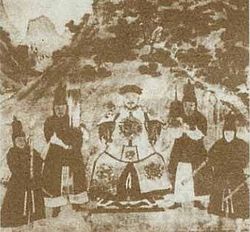Rebellion of the Three Feudatories
| Revolt of the Three Feudatories | ||||||||||
|---|---|---|---|---|---|---|---|---|---|---|
 Wu Sangui (center) was one of the three rebel leaders |
||||||||||
|
||||||||||
| Belligerents | ||||||||||
|
|
Wu Sangui Shang Zhixin Geng Jingzhong |
Chinggisid Chahar Mongol Zheng's Taiwan Other rebels |
||||||||
| Commanders and leaders | ||||||||||
|
|
Wu Sangui Wu Shifan Geng Jingzhong Shang Zhixin |
Borni (Burni) Abunai Lubuzung Zheng Jing |
||||||||
| Strength | ||||||||||
| 400,000 | Wu Sangui: 200,000 Shang Zhixin: 100,000 Geng Jingzhong: 200,000 |
Chahar Mongols: 10,000 Zheng Jing: 10,000 Wang Fuchen: Several thousands Sun Yanling: 10,000 |
||||||||
The Revolt of the Three Feudatories (Chinese: 三藩之亂) was a rebellion lasting from 1673 to 1681 in the Qing dynasty (1644–1912) during the early reign of the Kangxi Emperor (r. 1661–1722). The revolt was led by the three lords of the fiefdoms in Yunnan, Guangdong and Fujian provinces against the Qing central government.
In the early years of the Qing Dynasty during the reign of the Shunzhi Emperor, central government authority was not strong and the rulers were unable to control the provinces in southern China directly. The government initiated a policy of "letting the Han Chinese govern the Han Chinese" (以漢制漢), which allowed some generals of the former Ming Dynasty who had surrendered them to help them govern the provinces in the south.
In 1655, Wu Sangui was granted the title of "Pingxi Prince" (平西王; "West Pacifying Prince") and granted governorship of the provinces of Yunnan and Guizhou. Shang Kexi and Geng Zhongming were granted the titles of "Pingnan Prince" and "Jingnan Prince" (both mean "South Pacifying Prince") respectively and were put in charge of the provinces of Guangdong and Fujian. The three lords had great influence over their lands and wielded far greater power than any other regional or provincial governors. They had their own military forces and had the authority to alter tax rates in their fiefs.
In Yunnan and Guizhou, Wu Sangui was granted permission by the Shunzhi Emperor to appoint and promote his own personal group of officials, as well as the privilege of choosing warhorses first before the Qing armies. Wu Sangui's forces took up several million taels of silver in military pay, taking up a third of the Qing government's revenue from taxes. Wu was also in charge of handling the Qing government's diplomatic relationships with the Dalai Lama and Tibet. Most of Wu's troops were formerly Li Zicheng and Zhang Xianzhong's forces and they were well-versed in warfare.
...
Wikipedia
